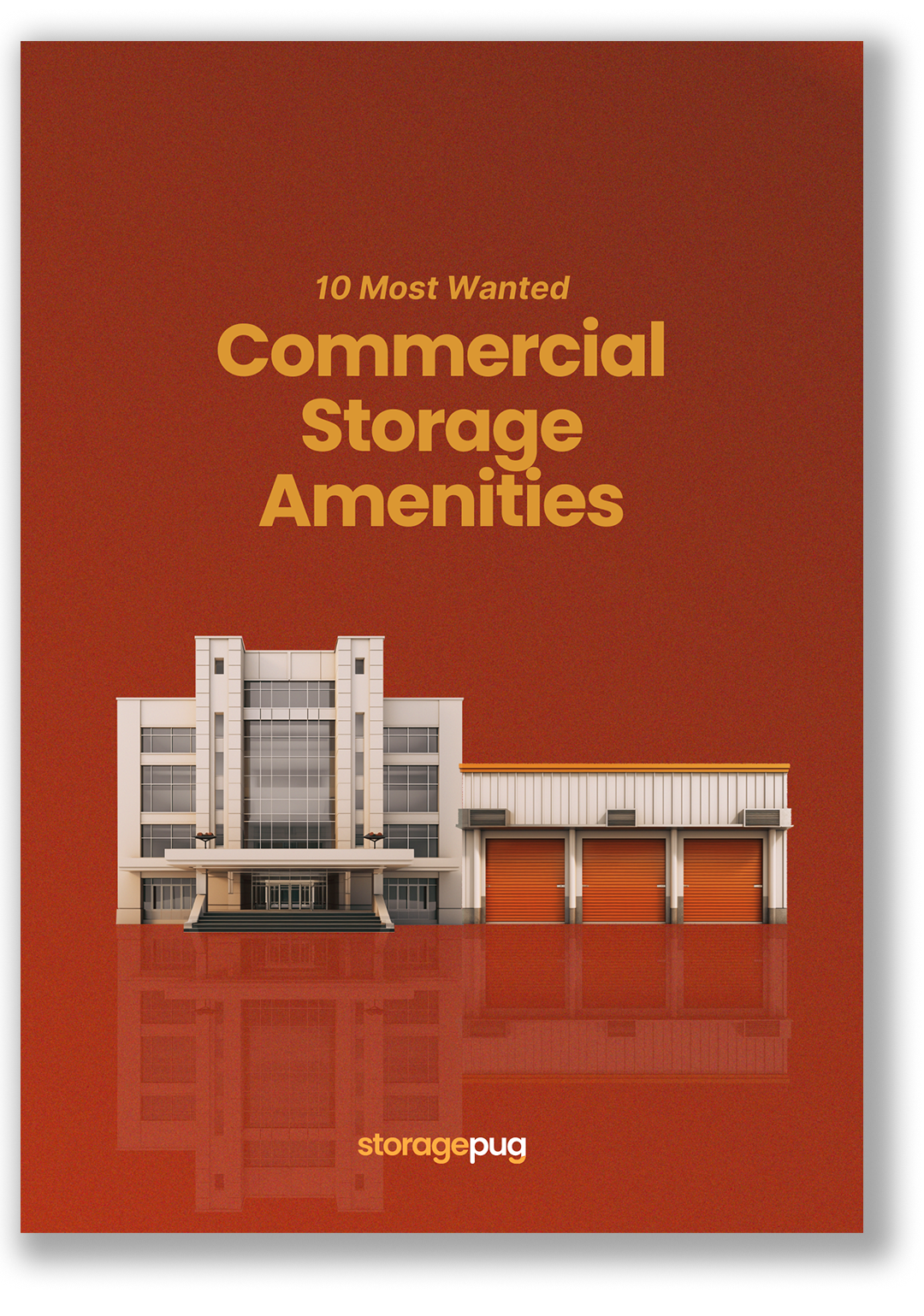Menu
July 24, 2023


You can’t make someone need storage.
You can encourage someone to choose your storage facility. You can make it worth their while, via price or features or convenience, but if they don’t have stuff they need to store, they aren’t going to give you any money.
That limits you to about 10-15% of the population for your customer base, according to studies. Good enough to keep your business growing, good enough to make a strong profit and build a business.
But what if I told you that there was a second customer base? Folks that may need a storage unit, but don’t know it yet?
Welcome to StoragePug’s Guide to Offering Commerical Storage!
Business storage is a great way to expand your business without having to buy a new facility or construct another building. Not only are local businesses an additional customer base, but they also rent longer, rent bigger units, rent more units, and are willing to pay more!
According to the 2023 SSA Demand Study, businesses storing in a self storage unit usually pay more than $175 a month for their storage needs - this is partly because they rent 10x30 or larger storage units, and partly because businesses have the means to pay for premium units where residential renters may not.
So, how do ambitious operators bring in this type of business? How can you add business storage to your existing model? And how can you grow your own business by catering to those businesses around you?
In this guide, we’ll break down everything you need to know about business self storage so you can open up your facility to a whole new range of customers!
Also called business storage, commercial storage is the rental of space by a business for storing items, documents, or equipment related to that business.
In practice, this means renting out storage units to nearby businesses for whatever purpose they need. Your traditional drive-up storage units can be used for commercial storage if a local business finds them suitable. However, businesses will be drawn to facilities that cater to their needs.
Commercial storage units are used because they are either cheaper or more convenient than adding more space to the existing business property. Local businesses can’t always add extra space just because they need it - zoning restrictions, financial constraints, time issues, etc. This is where your business is useful!
Your facility can provide a fast, affordable way to free up space in a neighboring business.
That can mean landscaping equipment, boxes of documents, office furniture, or inventory. Many of our storage operators work with contractors - making the storage unit the main warehouse for a small business!
With these tenants, your storage facility can be incredibly useful, and incredibly valuable! When you’re housing someone’s business equipment, they’re not going to be late on payment.
On the other hand, you’ll find commercial tenants that simply need extra stuff out of the way. Sometimes that means file folders full of medical records from a hospital, and sometimes it simply means extra office chairs that are waiting until the company can expand.
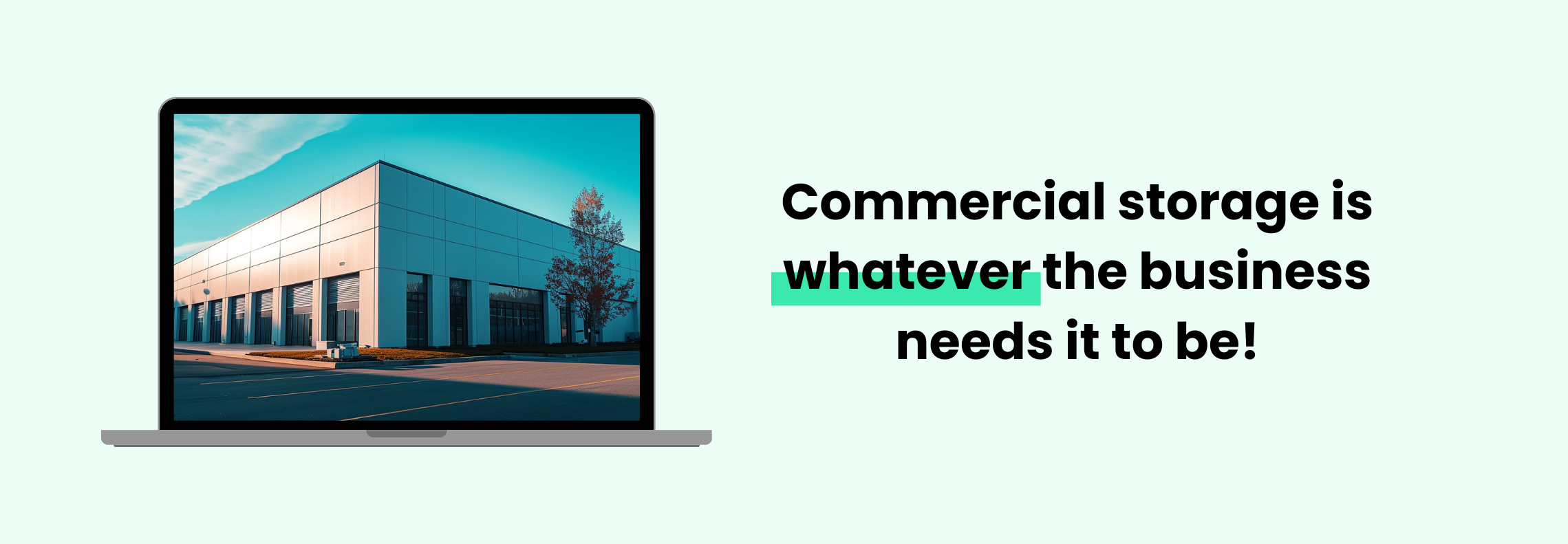
In short, commercial storage is whatever a business needs it to be!
Any business can use your storage units if they have extra stuff they need space for, but some business types are more likely to need you than others.
StorageCafe has a list of different business types that often use commercial storage units.
In general, small businesses that are just starting out need extra space. Some small businesses are operating out of the founder’s garage, and a storage unit is way cheaper than renting an office or warehouse.
Online retailers (think Etsy shops and the like) may need room to store their inventory. Others may want to use a storage unit as a workshop - these businesses will need power outlets and other amenities.
Larger businesses will reach out for a commercial storage unit if they have a long-term need. Often this comes in the form of document storage, which makes up about half of all commercial storage according to the Self Storage Association's Demand Study. Medical facilities especially need document storage because they are legally required to keep records for a decade or longer!

Large businesses may use storage for renovations, excess inventory, relocation, etc., but these are not as long-term or as common. You can certainly accommodate these needs, but it’s not efficient to focus on them because you can’t be sure when they’ll be needed.
Your job as the storage owner is to find out what your local businesses need your storage to be. First off, you need to know what they’re storing!
Before you can convince the business owners in your community that you can help them store their extra stuff, you need to know what that stuff is.
Per the demand study, most commercial storage units are used to hold inventory, records, office supplies, and equipment.
The renters answering the survey get to decide what to classify their items as - “equipment” could mean big lawn mowers or it could mean computer keyboards, depending on the type of business.
Some businesses listed “vehicles” separately from equipment, as well. If you offer vehicle parking (such as RV storage or boat storage), you may find local businesses that want to park their company vehicles with you - especially if they have a small office or a home office.

Inventory is the single largest category stored in commercial storage units. Your local businesses, ranging from hardware stores to furniture to hobby stores and everything in between, will all have fluctuating inventory.
If you can provide a cost-effective way for them to store it, you can help keep their stores clean, well-organized, and efficient.
Depending on the type of store, they may need a large storage unit or multiple units to maintain inventory. Consider offering discounts for second and third storage units rented to encourage businesses to choose your storage facility.

After inventory, the most commonly stored category is records and documents. This can range from business transaction records for e-commerce companies to confidential medical records at hospitals.
Businesses storing records and documents make great partners for commercial storage facilities. These renters will be storing for a long time - usually years, sometimes decades. They are often willing to pay more for premium storage amenities like climate control.
If you have a premium facility, these customers should be a high priority. They’re looking for security, climate control, and convenience. If you have this sort of business in your area, you should make an effort to form a partnership with them!
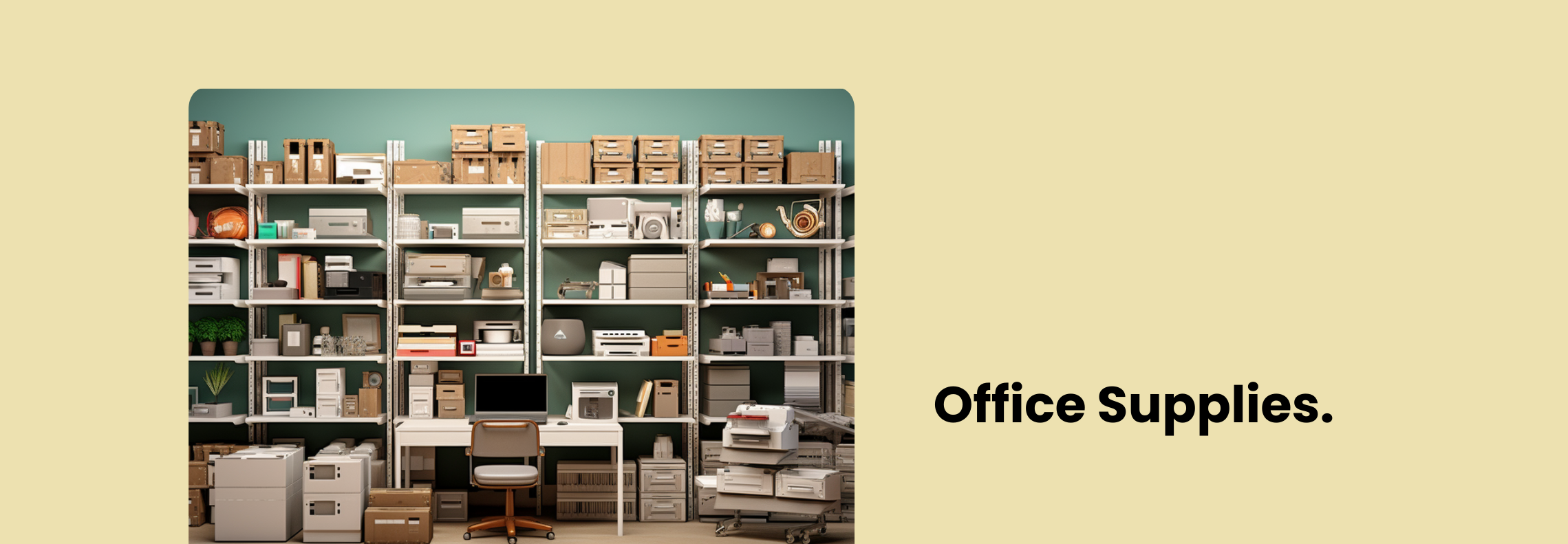
These businesses are more like residential renters - they’ve got more stuff and less room, and a commercial storage unit can help them free up their space.
Unfortunately, there is no reliable way to market yourself to these types of businesses because there’s no good way of knowing which businesses have excess office supplies!
Businesses storing office supplies also won’t have all the advantages of the prior two categories. With inventory or records, you can be confident that the renter will stay longer than average and may even be willing to pay more than average.
With office supplies, though, the business won’t necessarily store for longer, and they may not care about special amenities. Folks storing office supplies are great tenants and you should encourage them, but they’re not the same priority as the prior two categories.
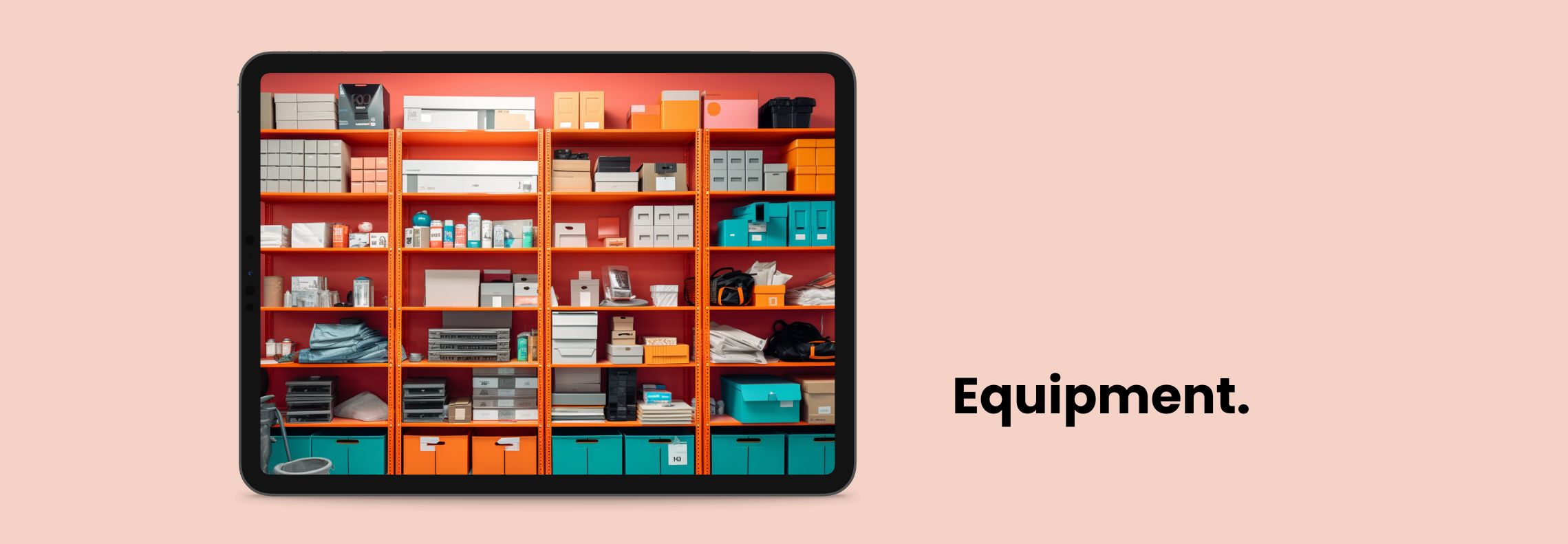
Businesses storing equipment make great self storage tenants, but you’ll have to work with them. If a business is storing equipment with you, that makes you an important part of their business - you’re holding on to the stuff that allows them to exist!
Business owners storing equipment will need to know that they can get to the equipment when they need it. They need to know their equipment (whether that be construction machinery, lawnmowers, or a table saw) will be safe in your storage unit.
They also need to know that you’re a reliable partner - even if you legally aren’t part of their business, in practice you are. These businesses will also be good tenants (usually). They would risk their whole business by refusing to pay, and they’d need to restructure their whole setup if they wanted to move out.
So, tenants storing equipment may need more of your attention, but their business is going to be worth that time.
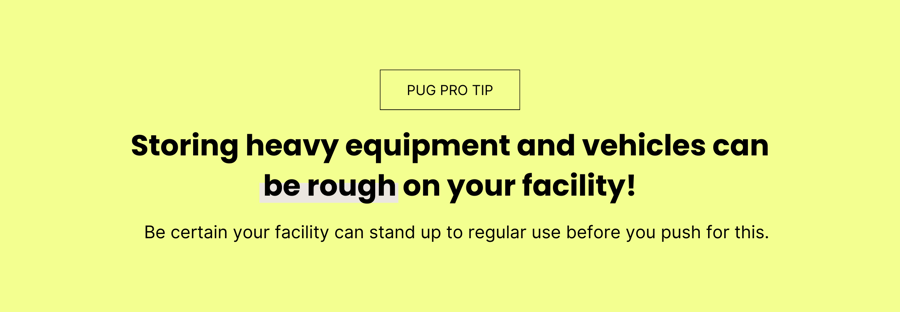
Because our operators know so much about storage, we sometimes forget that what we value and what our customers value aren’t always the same!
While you may know the value of an individually alarmed smart unit, that may sound like an unnecessary extra step to a new customer.
Like with our Top 9 Self Storage Amenities for residential storage, we’ll highlight what amenities commercial renters are actually looking for here.
24/7 access
![]() The most desirable feature you can offer a potential business storage renter is access. If they’re going to leave important parts of their business with you, they need to know they’ll be able to get to it when they need it. Many of our operators set up special 24/7 access codes with their commercial renters even if they don’t offer them to everyone!
The most desirable feature you can offer a potential business storage renter is access. If they’re going to leave important parts of their business with you, they need to know they’ll be able to get to it when they need it. Many of our operators set up special 24/7 access codes with their commercial renters even if they don’t offer them to everyone!
![]() If you want to offer commercial storage units, you need to offer 24/7 access, even if it’s just for these customers.
If you want to offer commercial storage units, you need to offer 24/7 access, even if it’s just for these customers.
Pest control
![]() Most of the commercial storage items we mentioned above are both expensive and susceptible to pest damage. Records, office furniture, and some types of inventory can be ruined by bugs. Remember also that commercial storage units are rented for longer periods of time. If your renter is going to leave their inventory with you indeterminately, pest control becomes even more important.
Most of the commercial storage items we mentioned above are both expensive and susceptible to pest damage. Records, office furniture, and some types of inventory can be ruined by bugs. Remember also that commercial storage units are rented for longer periods of time. If your renter is going to leave their inventory with you indeterminately, pest control becomes even more important.
![]() If you already offer pest control services, make sure you advertise this feature. They won’t ask, but they will choose a facility that they know has pest control.
If you already offer pest control services, make sure you advertise this feature. They won’t ask, but they will choose a facility that they know has pest control.
Drive-up access
![]() All renters are in a hurry sometimes - if someone is coming to get supplies, inventory, or equipment for their business, they’re probably in a hurry! Drive-up access is listed as one of the top amenities that business owners are looking for. However, they didn’t break this question down by stored items. People storing construction equipment will have much more need for a drive-up unit than those storing records!
All renters are in a hurry sometimes - if someone is coming to get supplies, inventory, or equipment for their business, they’re probably in a hurry! Drive-up access is listed as one of the top amenities that business owners are looking for. However, they didn’t break this question down by stored items. People storing construction equipment will have much more need for a drive-up unit than those storing records!
![]() Most of us offer drive-up access, so we don’t need to worry about this one. If you’re an all-indoor climate-controlled facility, though, you may want to focus your efforts on document and record storage, since no lawn service is going to park their mower inside on the third story.
Most of us offer drive-up access, so we don’t need to worry about this one. If you’re an all-indoor climate-controlled facility, though, you may want to focus your efforts on document and record storage, since no lawn service is going to park their mower inside on the third story.
Individual unit alarms
![]() These folks are trusting you with important facets of their business. The more secure your facility is, the better! Individual unit alarms give business owners confidence that your facility is keeping their business safe, and the alarms give them a feeling of control as well.
These folks are trusting you with important facets of their business. The more secure your facility is, the better! Individual unit alarms give business owners confidence that your facility is keeping their business safe, and the alarms give them a feeling of control as well.
![]() Unit alarms can be easy to add, depending on the company you choose, and you don’t have to add them to every unit. If you’re courting commercial storage customers, consider adding unit alarms to their units, even if you don’t want to install them everywhere. The investment could be well worth it!
Unit alarms can be easy to add, depending on the company you choose, and you don’t have to add them to every unit. If you’re courting commercial storage customers, consider adding unit alarms to their units, even if you don’t want to install them everywhere. The investment could be well worth it!
Online rental/payment options
![]() While you may have some residential customers that prefer paying with check or cash, modern businesses don’t often operate that way - imagine if your facility didn’t accept credit cards! Business owners have a lot of tiny tasks on their plate and they don’t want to add more - even if they’re easy. Online autopay and automatic billing options will make a business more likely to rent with your facility over the competition.
While you may have some residential customers that prefer paying with check or cash, modern businesses don’t often operate that way - imagine if your facility didn’t accept credit cards! Business owners have a lot of tiny tasks on their plate and they don’t want to add more - even if they’re easy. Online autopay and automatic billing options will make a business more likely to rent with your facility over the competition.
![]() Online payment is also hugely beneficial for lots of your residential customers, so if you don’t already have it, you should get it. Don’t make it harder for customers to give you their money. Autopay can bring you more money as it decreases the number of customers who miss payments. Some of our operators even offer discounts to get people to switch to autopay because it helps their business so much! If you don’t have online payment options, get them as soon as you can. If you do have autopay options, make sure your tenants, and potential tenants, know about it!
Online payment is also hugely beneficial for lots of your residential customers, so if you don’t already have it, you should get it. Don’t make it harder for customers to give you their money. Autopay can bring you more money as it decreases the number of customers who miss payments. Some of our operators even offer discounts to get people to switch to autopay because it helps their business so much! If you don’t have online payment options, get them as soon as you can. If you do have autopay options, make sure your tenants, and potential tenants, know about it!
Electronic gates
![]() Simple, easy, and most of you already have this one, but like some of those above, you need to let potential renters know that you have it! Picture someone shopping for extra storage space for their company - they may be scanning your website, weighing your prices and amenities against a competitor, and they probably aren’t actually visiting your facility until they rent!
Simple, easy, and most of you already have this one, but like some of those above, you need to let potential renters know that you have it! Picture someone shopping for extra storage space for their company - they may be scanning your website, weighing your prices and amenities against a competitor, and they probably aren’t actually visiting your facility until they rent!
![]() Use your marketing to point customers to your strengths. In this instance, the customer wants to know their stuff will be safe, even if they don’t know much about storage. Show them (and tell them) how safe your facility is - and your gate is the first security feature anyone encounters!
Use your marketing to point customers to your strengths. In this instance, the customer wants to know their stuff will be safe, even if they don’t know much about storage. Show them (and tell them) how safe your facility is - and your gate is the first security feature anyone encounters!
Fire sprinklers
![]() Another safety and security feature! We’re starting to detect a pattern with these commercial storage units. While your residential customers might be storing expensive or important items, your commercial customers certainly are. That means they’re more concerned about disaster than the average renter.
Another safety and security feature! We’re starting to detect a pattern with these commercial storage units. While your residential customers might be storing expensive or important items, your commercial customers certainly are. That means they’re more concerned about disaster than the average renter.
![]() Healthcare businesses are legally required to keep records for years or even decades depending on the state, and a fire at your facility could cost them almost as much as it costs you. If you have sprinklers or other fire suppression systems in place, make sure potential commercial storage unit renters know about it. Give them a reason to choose you over the competition.
Healthcare businesses are legally required to keep records for years or even decades depending on the state, and a fire at your facility could cost them almost as much as it costs you. If you have sprinklers or other fire suppression systems in place, make sure potential commercial storage unit renters know about it. Give them a reason to choose you over the competition.
Long-term discounts
![]() One of the reasons business storage is so valuable is that they rent for longer time periods than residential renters. This also means they’re going to be more concerned with your long-term rates than residential renters. While someone storing their grandma’s old furniture might think they’ll only need you for a couple of months, a doctor’s office knows they’ll be keeping those boxes of patient files for years and years.
One of the reasons business storage is so valuable is that they rent for longer time periods than residential renters. This also means they’re going to be more concerned with your long-term rates than residential renters. While someone storing their grandma’s old furniture might think they’ll only need you for a couple of months, a doctor’s office knows they’ll be keeping those boxes of patient files for years and years.
![]() There’s almost always going to be a sweet spot where you can make good money renting a commercial storage unit (or multiple units) at a discounted rate for a local business. This can be a great way to show businesses that you’re willing to work with them for both of your benefits.
There’s almost always going to be a sweet spot where you can make good money renting a commercial storage unit (or multiple units) at a discounted rate for a local business. This can be a great way to show businesses that you’re willing to work with them for both of your benefits.
Humidity control/Climate control
![]() Humidity and climate control were separate in the survey, but for most of our operators, they come in a single unit so we’ve combined them. Humidity and climate control are essential for document storage and for lots of inventory storage types. For vehicle parking and some types of equipment, this isn’t as important, and lots of commercial storage units don’t offer this.
Humidity and climate control were separate in the survey, but for most of our operators, they come in a single unit so we’ve combined them. Humidity and climate control are essential for document storage and for lots of inventory storage types. For vehicle parking and some types of equipment, this isn’t as important, and lots of commercial storage units don’t offer this.
![]() If you want to offer document storage (which is the most profitable type of commercial storage on average), you’ll need to have climate-controlled self storage units. If you don’t, then don’t invest too much energy in courting document storage customers and focus on local businesses that need storage for more durable items.
If you want to offer document storage (which is the most profitable type of commercial storage on average), you’ll need to have climate-controlled self storage units. If you don’t, then don’t invest too much energy in courting document storage customers and focus on local businesses that need storage for more durable items.
Flexible terms
![]() Like long-term discounts, flexible terms can be very beneficial to your local businesses. While your potential commercial renters do want long-term discounts, they can’t be sure that their needs won’t change. Flexibility will help make you a valuable partner!
Like long-term discounts, flexible terms can be very beneficial to your local businesses. While your potential commercial renters do want long-term discounts, they can’t be sure that their needs won’t change. Flexibility will help make you a valuable partner!
Depending on how many of the above amenities you already offer, adding commercial storage units is as simple as finding a business to rent them.
If you’re hoping to grow your business by actively finding businesses to rent with you, you may need to upgrade!
The easiest upgrades come in the form of policy changes that will make businesses more likely to rent with you.
First, and most importantly, is allowing 24/7 access to your facility! If you don’t have fencing and a security gate, congratulations - you already offer 24/7 access. If you do, you should be able to tell your security gate system to admit certain identification codes no matter what time it is.
The actual process for doing this will differ based on the security gate software you’re using, so we can’t go into a detailed guide here, but your software folks should be able to help.
Many operators are afraid that 24/7 access will lead to an increase in theft and vandalism because people will be on the property when management isn’t around. Others argue that the hours and fencing aren’t going to stop thieves and only inconvenience customers.
We don’t have a verdict on this! All we can say is that 24/7 access is very important to commercial customers. Offer it to specific customers you trust, especially businesses, if you can.
Second, add individual unit alarms to certain units. Upgrading some or all of your units to smart storage units can give you a leg up on your competitors when you’re wooing local businesses.
Individually alarmed units are going to cost you a bit more, but you can also pass most if not all of that premium onto the customer - if they’re storing items vital to their business, they’ll be willing to pay for the upgraded security.
This is a great choice for upgrading your facility because you can find a medium-cost solution just for those renters who want the upgrade. Often storage facilities will find themselves unable to charge a premium for their amenities because renters don’t understand the amenity. If you can offer it only to those who actually do want it, you won’t be wasting money.
Check out our article on value pricing for more information on meeting your customers at the price point they’re looking for.
Third, offer flexible pricing. This is easy to add, but only if you know what the business storage renters are looking for. Think about long-term discounts, reduced rates for those renting more than one unit, and special offers for community businesses.
You don’t have to do anything spectacular here. The only goal is to structure your discounts to appeal to a different type of customer. Remember, commercial storage customers rent for longer, rent more units, and rent higher-tier units - make sure they feel like they’re getting a good deal and you’ll make your money back quickly.
No matter how good your deals are, though, you have to make sure your customers know about them! A large part of adding commercial storage is just making yourself known to local businesses - and making sure they know why your facility is their best choice!
For a lot of storage facilities, the only change you’ll need to make to start making money through commercial storage is convincing businesses to rent with you!
Commercial and business storage is worth significantly more to your business than equivalent residential customers. As we’ve said above, they rent longer, the rent more expensive units, and they rent more units.
A single business renter could be worth a dozen residential tenants over the lifetime of the rental. That means you can justify spending significantly more time and money in marketing to business renters.
There are three main ways to go about marketing to businesses:

Adding business needs to your existing marketing is the easiest, most cost-effective way to reach out to these valuable customers. When you’re advertising your amenities to your community, be certain to include the above amenities that businesses find important!
Add these amenities to your website, to your billboards, and to your store signage if they’re not there already. Add a few instances of “happy to serve our neighbors and local businesses,” or whatever version of that matches your brand.
In addition to adding marketing features that will attract business renters, you can advertise in places where businesses are more likely to see them.
Consider sponsorship opportunities with local business associations and membership in those organizations. If there are local business magazines, see if you can advertise in those at reasonable rates. Every area is different, but there are going to be some places where you can find the eyes of business owners that might be interested in your services.

This is the best way to get in touch with businesses you think you could help. Some of our larger operators insist that their managers contact local businesses regularly - to create good relationships, to share business cards, and to offer referral bonuses. So this is a good tactic even if you aren’t planning on renting a storage unit to your local businesses.
The type of storage you offer determines which businesses you should be sure to reach out to. If you have climate-controlled self storage units with premium security features, you should reach out to businesses that might need to store records - like hospitals, doctors offices, pharmacies, etc.
If you lean more towards drive-up storage and parking, reach out to the more physical businesses. Contractors, construction companies, landscaping services, and anyone that has large equipment but may not have room to store it.
When you reach out, you don’t need to be a salesperson. Just introduce yourself, shake a hand or two, and leave them with some business cards (and donuts). Mention your referral program and your business-specific discounts, then get out of their hair. Quick visits are best for other businesses and for you!
Business and Commercial Storage Units
Now that you understand why other businesses can be beneficial to your storage facility, you’re ready to start making those partnerships.
Look at the businesses around you as an untapped customer base. These customers are highly valuable, but you don’t need to reinvent your business to cater to commercial storage unless you’re finding incredible success with it already.
Take the ideas here and adjust them to fit your community, too! If you can find even one or two good businesses to store with you long term, it’ll be well worth the effort.
For more self storage articles, take a look at:
StoragePug is a modern marketing company for self storage. We create intelligent marketing websites that allow you to rent units & take payments through your facility's websit
